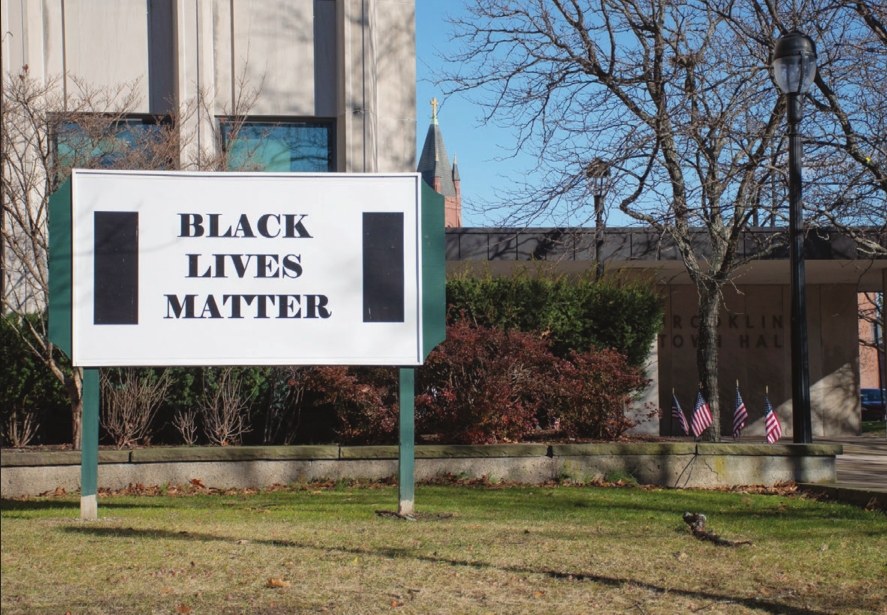
The Black Lives Matter sign in front of Brookline Town Hall.Select Board vote puts limits on signage
The Black Lives Matter sign has been displayed in front of Brookline Town Hall for more than three years as a symbol of racial justice. But soon it will be removed after town officials voted to limit signage on town property.
The new regulation, approved Dec. 5 by a unanimous vote from the five-member Brookline Select Board, clarifies the board’s role as the only body that can approve signs and other “expressive outdoor fixtures” like flags on town property.
The policy includes a timeline requiring that without specific approval, signage can only stay up for 30 days. Under this requirement, the policy will lead to the removal of the Black Lives Matter banner, which was first hung in 2020 following the murder of George Floyd.
Bernard Greene, a member of the Select Board, said it is time for the banner to come down.
“We made the point. The issue that it represents is still an issue that we recognize,” he said. “In our actions as a town, including efforts to protect communities that have been threatened because of their ethnicity, their race, or they’re LGBTQ, our responsibility is to protect them, and we do.”
Public discussions around the policy have been tied to the Black Lives Matter banner and, more recently, posters meant to bring attention to Israeli hostages following the attack by Hamas on Oct. 7 and the war that broke out in response.
Greene said the town’s talks about the regulation predate the Oct. 7 attacks and stem instead from a 2022 Supreme Court decision. Charles Carey, Brookline town administrator, said the work might have been informed by discussions around the banner and posters.
In that decision, Shurtleff v. City of Boston, the court found that the city’s rejection of a Christian flag on City Hall Plaza violated the First Amendment.
The new policy does not break any new ground. The Select Board already has authority over what signage can be hung on town property. Carey said the guidelines approved Dec. 5 instead provide clarification and bring attention to the issue.
Members of the town’s leadership said the policy isn’t about picking and choosing which voices are heard, but rather it is meant to be neutral.
“We want to be very clear to the public that there is no discrimination on the basis of message,” Carey said.
In a statement at the Select Board’s meeting, following the approval of the policy, board member John VanScoyoc said the policy was intended to make sure hateful messages didn’t get put up and stay up on town property.
“This has all been an exercise in trying to craft a policy that makes sure individuals in the community can’t use town properties at their own discretion,” he said. “Only the Select Board, who are the elected officials of the town, can decide to use town properties for the furtherance of a message.”
Greene urged people who want to share a message to do so through signage on private property or through demonstrations, adding that town property should not serve as a bulletin board for people’s views.
“The point is that town property is not a place for that type of discussion or forum,” he said. “Our parks and our sidewalks ... are public forums, and people can have demonstrations and carry signs with them on our sidewalks in our parks and other places, but even then, they can’t post signs on public property.”
The new policy allows for the Select Board to install signage and flags to express views supported by the town government.
The policy exempts Brookline schools and their public libraries. It makes specific exceptions for informational fixtures from departments in the town government and flags that advertise or commemorate events and celebrations listed on the town calendar.
Though the Black Lives Matter banner is set to come down, it won’t be removed until early next year, due to logistics around its removal, Carey said.
“We don’t have the people power, necessarily, to …do the job the right way,” Carey said. “We don’t want to leave the yard looking [like] a mess.”
Greene said that symbols like the banner tend to lose meaning after a while.
“After 30 days, the message may be important, but putting the sign up becomes kind of meaningless,” Greene said, “and if that’s all we’re doing [then] that is the problem.”